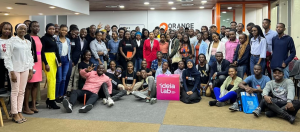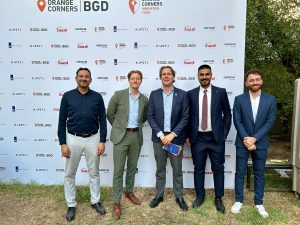Adeyemi Olutoye is the founder of Drugstore Nigeria, an online marketplace for authentic and affordable medications in Nigeria. Every day, Drugstore contributes to improving the accessibility of medicines to Nigerians in rural and urban areas alike, to ensure healthy lives and well-being for all. As one of our most successful graduates, Yemi was chosen to participate in our mixed Ghanaian-Nigerian delegation to the West Africa Deal Summit 2023, where your travelling reporter spoke to him about Drugstore’s past, present and future.
Hi Yemi, thanks for being here with us today! Could you briefly introduce yourself and your business?
I’m Yemi or Adeyemi Olutoye, and I’m an entrepreneur. I have a background in economics and before starting Drugstore Nigeria I worked in digital marketing. I did an internship with what’s now one of Nigeria’s biggest technology news outlets when they were just getting started, worked for one of the top three digital marketing companies for about a year or so. And then in my final year at university I started Drugstore.

I got introduced to technology when I was in school, and I felt the time was right to start using technology to solve a problem that I’d seen my dad struggle with in his pharmacy since I was a kid: the unavailability of drugs. Drugstore was just an idea then, but as soon as I submitted my final research paper I went to my dad to ask for a loan to start up a business. Of course he didn’t lend me the money, he gave it to me – even though he didn’t really believe in technology at the time. That was my first seed fund, the money for the MVP. We did the MVP in 2018, and by 2019 we were starting to get traction, people started buying. And then in 2020 COVID came and things escalated. I was still working with my dad in his pharmacy, and he started to see that what I was doing actually made sense.
Around this time we really tried to professionalise, making sure we were profitable, put the profits back into the business to grow it further. And then some time in late 2019 or early 2020 Orange Corners came along. Back then we were a very small team, I had just one or two employees. I applied just before the deadline, forgot that I applied until Cindy (Orange Corners Nigeria) called to invite me to pitch at their office. And after that things took off!
My dad provided me with my first seed fund, even though he didn’t really believe in technology at the time
Ademyemi Olutoye, Drugstore Nigeria
Can you tell us a little more about the problem you address with Drugstore Nigeria?
In Nigeria, there’s a medicine distribution problem. Four out of ten times customers can’t find the medicines that they’re looking for. This seems to be caused by the fragmentation of the industry. There was a time when the economy was booming, you had the likes of Pfizer and all, they were fully present in Nigeria. But when the economy lagged, they left and this created a huge gap. People didn’t know where else to get their drugs from. You might have a referral, but no idea where that drugs was available. As a kid, I was sick a lot. And I was lucky to have a dad for a pharmacist, he could call colleagues. But what about those people who don’t have a dad as a pharmacist? People would die because they couldn’t find injections, vaccines or drugs.
Another problem is that the industry is largely based on credit. Most of the pharmaceutical startups, they give a lot of credit. When you buy medicine to stock your pharmacy, you don’t need to pay immediately. You pay when the medicines are sold. And then you’ll get new medicine. So the margins are very low and this isn’t as profitable. Most of the profit is held in the stock on the shelves. This requires a lot of investment, it’s very capital-intensive. And the shelf life of medicine is quite short. You can buy medicine now, but in two years’ time it’ll be expired and you have to throw it out. So you’ll only put on the shelves what you’re sure to sell.
It’s really a distribution problem, not a production problem. The drugs are available, although Nigeria imports about 70% of the medicine we consume. AstraZeneca, Pfizer, they’re all brought from the UK or US and rebranded here. Although these medicines are expensive, sometimes people can’t afford them. so we partnered with some fintech companies to create payment plans. You get your medicine now and pay back later.
In Nigeria, there’s a medicine distribution problem. Four out of ten times customers can’t find the medicines that they’re looking for. And it pretty much affects everyone, urban and rural, people with higher and lower incomes.
Ademyemi Olutoye
This distribution issue, does it hit every part of the population equally or is it particularly hard on a particular segment of the population?
It pretty much affects everyone, urban and rural, people with higher and lower incomes. The top of the top of Nigerians are the ones that can afford health insurance, but they also have the same problem. For prescriptions, HMOs or Health Maintenance Organisations keep referring you to pharmacies that don’t have the drugs. So you need to take your HMO card to the next pharmacy. And the next. So at some point sometimes people just give up and pay out of pocket, because they keep getting referred to pharmacies that don’t have the medicine. But most Nigerians aren’t rich and 90% pays out of pocket anyway. And many Nigerians also don’t believe in paying money for insurance when they’re not sick, they’ll only look for help when they’re utterly sick – which is more expensive of course. And they pray a lot, we’re very religious people. We pray not to fall sick.
So access to medication is probably not just a problem in Nigeria. Do you think the Drugstore solution is scalable to other countries as well and can be used to solve a more global issue?
On the technical end, the solution is definitely scalable. We have inventory software that pharmacies can get from us, and when they use it we can see what they have, and we can let people know where to go when they’re in need of certain medication. But where there are no pharmacies, we have to bear the financial brunt of starting a pharmacy or importing the medicines from wholesalers. Normally we don’t want to do that, but sometimes we’re forced to do that because we have a lot of demand and not all pharmacies can cope with the demand. And there’s places in Nigeria where they still rely on their traditional medicine. Some drugs are considered a cure for everything. But there are countries that have a thriving pharmaceutical sector: Nigeria, Kenya and Ghana, for example. If we’re going to scale there, it’d go much faster. The market is already pretty mature, people already buy medicines, they have pharmacies, sometimes even online pharmacies. So it makes sense for us to go there and plug into what is already happening there. But right now we’re mostly focusing on the Nigerian market though.
You’re here with us today at the West Africa Deal Summit because we believe you’re an entrepreneur with great potential. Why are you here, and what are your hopes and aspirations for this summit?
So two weeks before the summit, my baby was born. So I didn’t really want to come. But my wife and I had two weeks to talk about it, and she told me to go meet people, bring back money and grow the business. So I’ve come here with that mindset: I’m committed to meet investors, committed to raise money. And so far so good!
So I’m here to raise money to build a solution that automates our process. Currently, our processes are manual. We have partners, but we don’t have a live inventory of their items. And they keep selling offline in their pharmacies. So if they give us an inventory at 8 eight o’clock this morning, it could be that five or ten minutes later an item is sold offline. And we still assume that they have the item and we tell the customer to go there. It means that we’re also contributing to the customer’s problem. So we normally call the pharmacies to confirm it, but we can’t keep doing that. So we want to automate. The customers see an item, see when the inventory was last updated, with the address of the pharmacy. So they can pick drugs up without having to call us.
We would like to become the largest online pharmacy, at least for Nigeria. Or even for Africa.
Ademyemi Olutoye
Alright, so that’s your short-term plan. What about your long-term plan? If you’re thinking further along the line, where do you see Drugstore Nigeria going?
We would like to become the largest online pharmacy, at least for Nigeria. Or even for Africa. Last week we already bought the Drugstore Africa domain, because we’re thinking long-term. Product-wise in the next 2-3 years, we would like to be the go-to place online for HMOs, pharmacies, individuals – a bit like a Google Maps for drugs. Think “I need this medicine, I pick up my phone, check the pharmacy that has it near my location and just go there”. My vision for us is to make drug unavailability really a thing of the past!
Follow Yemi’s Drugstore online:
Website
Facebook
Instagram
Twitter





